 Petzlover
Petzlover Chiapom is originated from United States but West Siberian Laika is originated from Russia. Chiapom may grow 36 cm / 14 inches shorter than West Siberian Laika. Chiapom may weigh 15 kg / 33 pounds lesser than West Siberian Laika. Chiapom may live 4 years more than West Siberian Laika. Chiapom may have less litter size than West Siberian Laika. Chiapom requires Moderate Maintenance. But West Siberian Laika requires Low Maintenance
Chiapom is originated from United States but West Siberian Laika is originated from Russia. Chiapom may grow 36 cm / 14 inches shorter than West Siberian Laika. Chiapom may weigh 15 kg / 33 pounds lesser than West Siberian Laika. Chiapom may live 4 years more than West Siberian Laika. Chiapom may have less litter size than West Siberian Laika. Chiapom requires Moderate Maintenance. But West Siberian Laika requires Low Maintenance
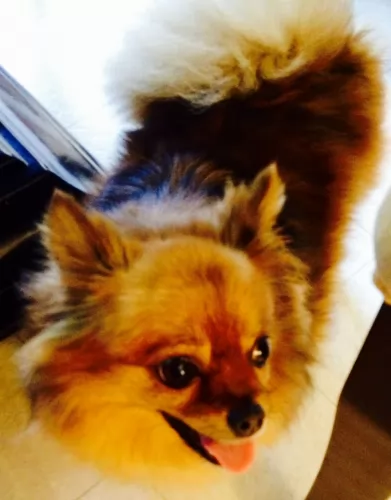 The Chi-Pom or Chiapom comes from mixing the Pomeranian and the Chihuahua, and both these dogs are toy breeds and known as companion dogs.
The Chi-Pom or Chiapom comes from mixing the Pomeranian and the Chihuahua, and both these dogs are toy breeds and known as companion dogs.
These little dogs each have their own individual histories, but but being a cross breed, the Chi-Pom’s history isn’t well documented particularly well.
Nobody seems to know precisely when this new dog breed came into being, but they were first bred in the United States.
 The West Siberian Laika come from the Khanty and Mansi tribes of West Siberia and Ural. They are a primitive breed used for hunting and come from the spitz and wolf lines. They retain many of their primitive looks and traits to this day. They were pre-historic companions to human hunters and remain so today in the northern regions of the Russia. They were never sled dogs but pure hunters throughout their journey to a domesticated breed. They hunted in the forests of the mountainous regions and were adapted to hunting in the woods. When their prey was hunted almost to extinction, the Laikas were also in danger of disappearing.
The West Siberian Laika come from the Khanty and Mansi tribes of West Siberia and Ural. They are a primitive breed used for hunting and come from the spitz and wolf lines. They retain many of their primitive looks and traits to this day. They were pre-historic companions to human hunters and remain so today in the northern regions of the Russia. They were never sled dogs but pure hunters throughout their journey to a domesticated breed. They hunted in the forests of the mountainous regions and were adapted to hunting in the woods. When their prey was hunted almost to extinction, the Laikas were also in danger of disappearing.
From the early days of the 1900’s through the first World War, there were several campaigns to save the WSL from extinction. A breed standard was developed around the 1930’s. Following the war the breeding programs became more uniformed and followed the standard that was in place. World War II disrupted it again, but once again it was resumed after the war.
The breed was once again threatened by industrialization and deforestation in the early 20th century, as they were replaced by newer, more popular breeds. There were thought to be dozens of aboriginal Laikas with various groups attached to different groups of indigenous hunters.
Following the second World War and the ever increasing detail of breed standards, the Laikas were divided into four pure bred groupings: the West Siberian Laika, the East Siberian Laika, the Russ-European Laika and the Karelo-Finnish Laika. All of these breeds are Laikas because they are bark pointing hunters.
They were imported to the U.S. in the early 1990’s by a Russian immigrant. Vladmir Beregovoy is credited with bringing the breed to the States. There are now about 300-400 West Siberian Laika’sin the U.S. They are a very emotional breed, very in touch with his human’s feelings, habits and intentions. He is a barker for sure who hates to be left alone. An intense breed with the need for companionship and a purpose. They will do anything to escape a pen if left alone for long periods of time.
The breed is protective of its people with other animals and some are wary of strangers. He needs an active family to match his active spirit. They will bark at all wild life including all the squirrels in your yard. So if don’t want a “barker”, don’t get a West Siberian Laika.
They are recognized by the United Kennel Club, the American Canine Association the Dog Registry of American and the Federation Cynologique Internationale
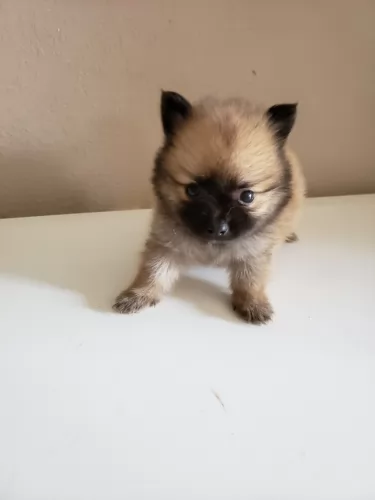 The Chi-Pom or Chiapom isn’t a pure bred dog, but a cross between the Chihuahua and the Pomeranian. This toy breed’s coat can be shortish like the Chihuahua or feathery and medium to long like with the Pomeranian, and the coat will be soft and shiny.
The Chi-Pom or Chiapom isn’t a pure bred dog, but a cross between the Chihuahua and the Pomeranian. This toy breed’s coat can be shortish like the Chihuahua or feathery and medium to long like with the Pomeranian, and the coat will be soft and shiny.
He has pointed ears, much like a fox, and the long tail is carried upward and curls over the back. The coat can be a solid color such as white, tan, cream, fawn, brown or gray, with the most common color being light brown.
If he takes more after the Pomeranian, he may need to have his hair cut. The typical Pomchi dog’s head is more round that the Pomeranian but with the narrow muzzle. The eyes are large and dark.
The Chiapom is a small dog that measures just 15 – 25cm in height and weighs between 2 and 8kg.
Pomchis are intelligent and inquisitive, having a temperament which comes from either of the two breeds which are quite similar.You’re definitely going to have an entertaining little dog, one who is energetic, curious and alert.
He isn’t a good choice with small children as he gets nervous and aggravated when handled improperly. Nervous and hurt, he may nip and then often he gets the blame, whereas he just shouldn’t have to put up with small children.
He loves to be in the company of his human family who treat him well, and he doesn’t like to be left alone. He is an intelligent little dog and is eager to learn. Therefore, even though he is small, training and socialization will be good for him and give him an even more amicable disposition.
 The WSL comes from the Spitz line and also directly descendent from the wolf. They look and act a lot like a wolf in many ways. They have retained much of their primitive traits. With a pointed, long muzzle, an almost square head, and square body, they have wolf colored coats of gray and red. They are mostly medium in size but some can be smaller or larger. Their head is shaped like a wedge, their eyes are typical almond shape and set deep in their head. They are brown or even darker. The muzzle is almost as long as the skull. Their lips are thin and black. The ears are straight up and pricked.
The WSL comes from the Spitz line and also directly descendent from the wolf. They look and act a lot like a wolf in many ways. They have retained much of their primitive traits. With a pointed, long muzzle, an almost square head, and square body, they have wolf colored coats of gray and red. They are mostly medium in size but some can be smaller or larger. Their head is shaped like a wedge, their eyes are typical almond shape and set deep in their head. They are brown or even darker. The muzzle is almost as long as the skull. Their lips are thin and black. The ears are straight up and pricked.
They have bodies longer than they are tall with a lot of musculature. They carry their tail high over their backs. With straight legs and forward feet, with gray, red and white coats, they still look like wild dogs.
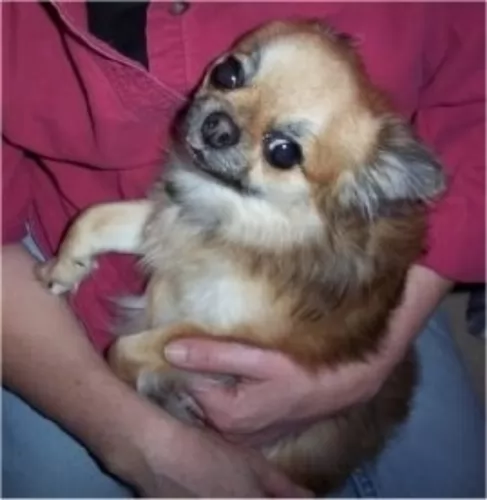 Crossing two breeds of dog is the in-thing these days, and its not surprising that lovers of small breed dogs would think to mix the Chihuahua and the Pomeranian.
Crossing two breeds of dog is the in-thing these days, and its not surprising that lovers of small breed dogs would think to mix the Chihuahua and the Pomeranian.
The Chiapom is affectionate, playful and good-natured with their human family. They are full of personality, are spunky and brave, believing they can protect their families. He may be too frail for this but he alerts you to danger with his barking.
With the Chiapom, you’re going to have an awesome little friend who will stand by you in thick and thin.
 3.Adaptability This is not really an apartment dog though he can adapt. He needs outdoor space to run everyday. So if in an apartment find a dog park for everyday use.
3.Adaptability This is not really an apartment dog though he can adapt. He needs outdoor space to run everyday. So if in an apartment find a dog park for everyday use.
4.Learning ability – Highly trainable and very smart. Independent thinker though might cause some issues.
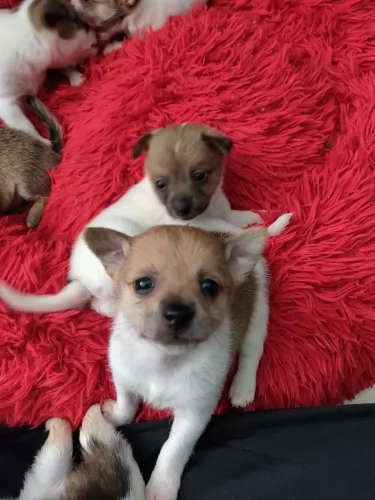 Being a cross bred, the Chiapom will be healthier than the purebred Chihuahua or Pomeranian. He is full of personality, but sometimes he can have his fair share of doggy troubles too.
Being a cross bred, the Chiapom will be healthier than the purebred Chihuahua or Pomeranian. He is full of personality, but sometimes he can have his fair share of doggy troubles too.
He is more prone to injuries just because he gets under your feet all the time. We look at one or two health issues with this small breed that you should be aware of -
This is an ailment which can be found in all dogs but it occurs more in smaller dogs. An inflamed pancreas from trauma, infection or a metabolic disorder can mean your little dog vomiting, being uncomfortable with stomach pain and shivering.
This is a disease which involves the trachea which is also known as the windpipe. When the windpipe weakens, it becomes difficult to breath. Obesity in your pet as well as dust and kennel cough can contribute to this ailment.
 Health wise there are no genetic health issues known today. Since they were so wild, primitive and isolated there was not a lot of inbreeding to any standards. There are however some interesting health facts about the WSL.
Health wise there are no genetic health issues known today. Since they were so wild, primitive and isolated there was not a lot of inbreeding to any standards. There are however some interesting health facts about the WSL.
• Females only come into estrus once a year, usually in the late winter. They are usually one to two or two and a half years old when this happens. The Russians who know them best frown on breeding them before they are at least two.
• They are subject to many of the same parasites and some diseases like any other canine. But they are not susceptable to any illness specific to their breed.
• Hunting accidents might bet he biggest health threat this breed faces at the moment.
• However with more dogs being bred for the show ring, this could all change and genetic issues could begin to pop up for them.
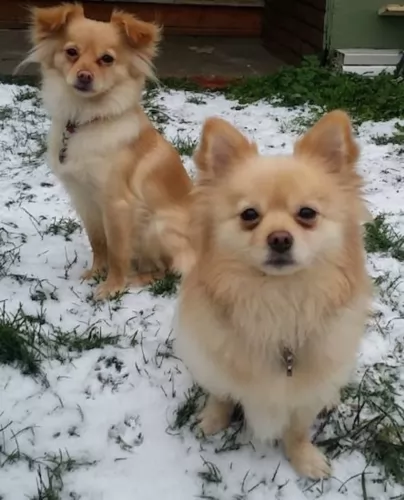 The Pomchi is a small dog who is looked upon essentially as an indoors dog, so it is quite able to adapt to apartment living as he won’t require large doses of exercise.
The Pomchi is a small dog who is looked upon essentially as an indoors dog, so it is quite able to adapt to apartment living as he won’t require large doses of exercise.
With some stimulating toys, he is able to exert energy indoors and will love to chase a ball down the passage. He certainly won’t do well in cold weather and being left outdoors.
The Chiapom often has the longer hair of the Pomeranian so it becomes necessary to give your little dog a good brush twice a week for the hair to remain tangle-free and to keep it shiny and silky.
You’ll notice with your Pomchi that he could possibly have overactive tear ducts so that they have a discharge. A small damp cloth can be used to wipe his eyes.
Small breed dogs often require more calories than larger dogs because of their higher metabolic rates. He is a small dog that will require all the right vitamins and minerals.
Commercial dog foods are certainly convenient, and the best quality ones contain the nutrients a dogs needs to remain health. It is always beneficial for your 4-legged friend if you can include some brown rice, a little bit of cooked chicken and vegetables in his diet. However, if you are uncertain about the nutrition requirements of your pet, speak to your vet and get help with a food that caters for your dog’s age, breed and activity levels.
 performance, working dog food. High in protein and fat is needed to maintain their lean muscle. Don’t over feed them as they will become obese and they will be unhappy if their physical activities are restricted, even if by their own weight. Be sure you break up their day’s food amount into 3-4 smaller meals.
performance, working dog food. High in protein and fat is needed to maintain their lean muscle. Don’t over feed them as they will become obese and they will be unhappy if their physical activities are restricted, even if by their own weight. Be sure you break up their day’s food amount into 3-4 smaller meals.
2.Feeding the adult – Almost everything is equally true for the adult. They need a high protein and high fat food – a high performance food. Don’t over feed and give them at least 2 meals per day.
3.Points for Good Health – as previously mentioned this is a hardy and robust breed,
4. Games and Exercises They need a lot of exercise, have a strong prey drive and are very intelligent. A dog with those traits that does not get enough exercise will drive you crazy if he is not stimulated.